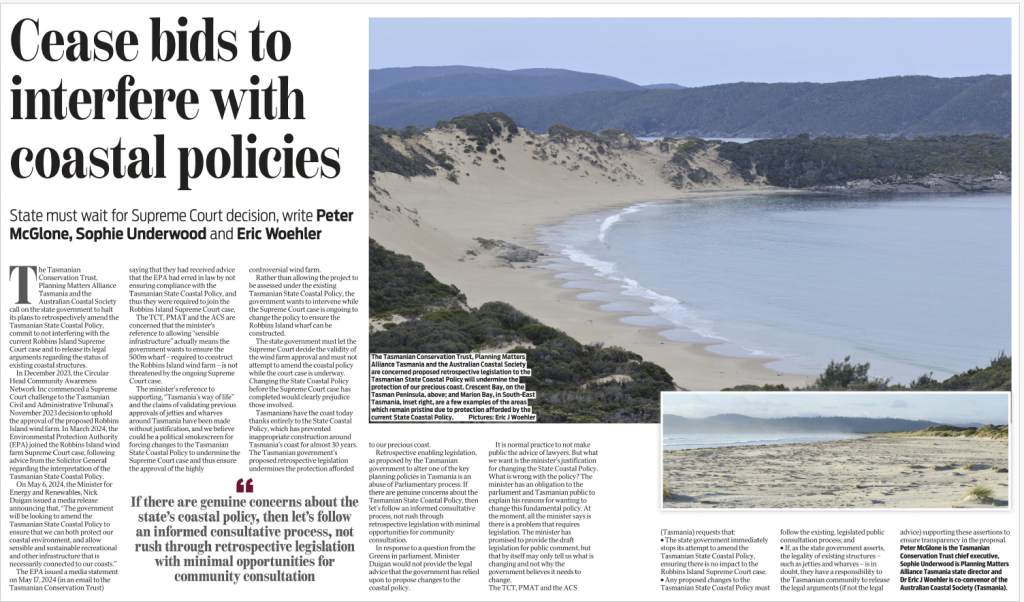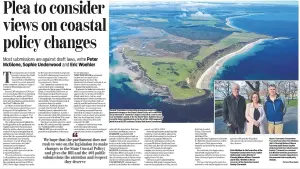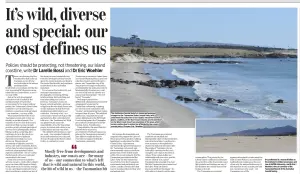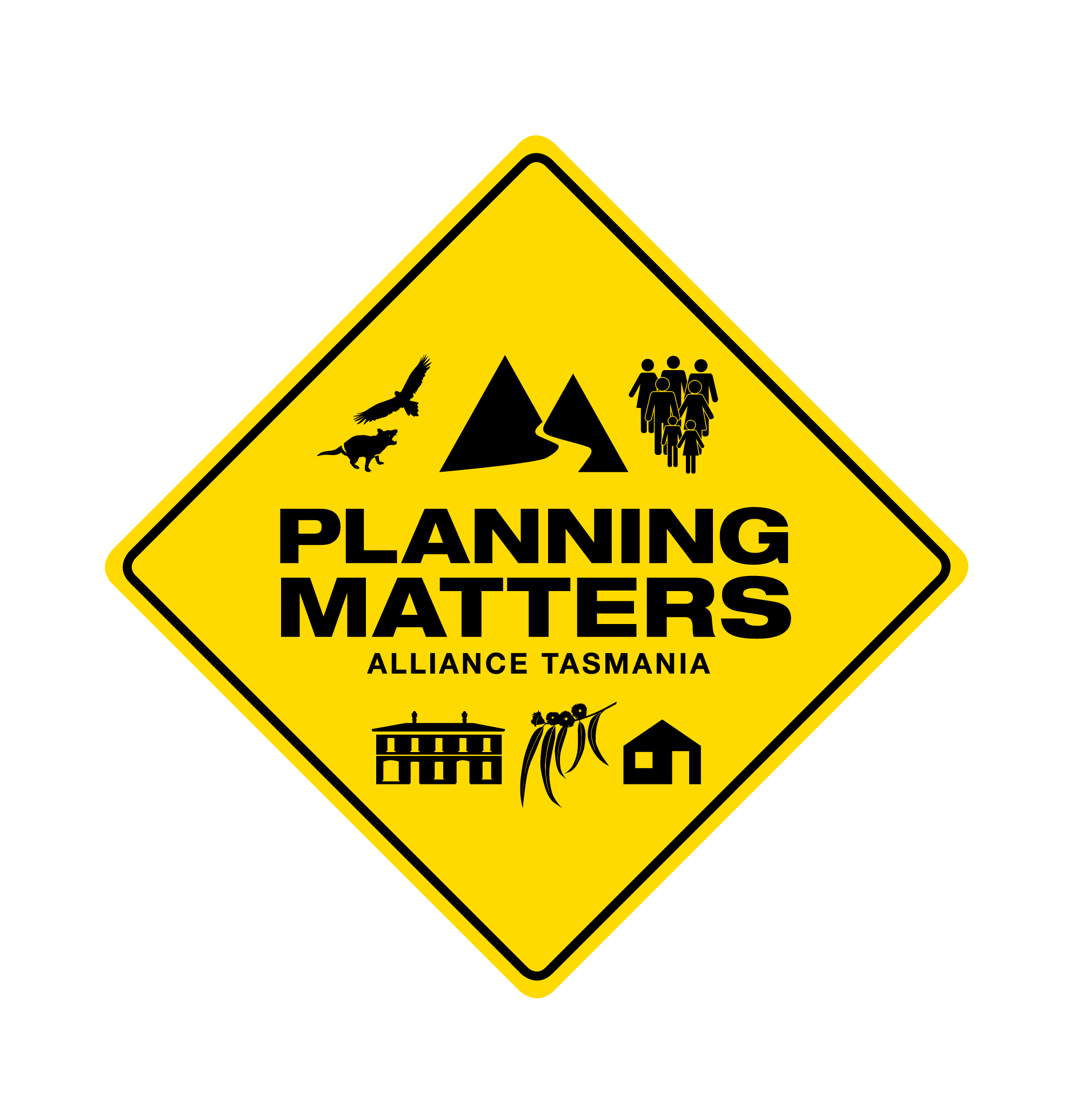- Opinion Piece
Mercury Opinion Piece: “Cease bids to interfere with coastal policies”
Media Enquiries
Sophie Underwood
PMAT State Director
sophie_underwood@hotmail.com
0407 501 999
Please share:
The Tasmanian Conservation Trust, Planning Matters Alliance Tasmania and the Australian Coastal Society are concerned proposed retrospective legislation to the Tasmanian State Coastal Policy will undermine the protection of our precious coast. Crescent Bay, on the Tasman Peninsula, above; and Marion Bay, in South-East Tasmania, inset right, are a few examples of the areas which remain pristine due to protection afforded by the current State Coastal Policy. Pictures: Eric J Woehler.
The Tasmanian Conservation Trust, Planning Matters Alliance Tasmania and the Australian Coastal Society call on the state government to halt its plans to retrospectively amend the Tasmanian State Coastal Policy, commit to not interfering with the current Robbins Island Supreme Court case and to release its legal arguments regarding the status of existing coastal structures.
In December 2023, the Circular Head Community Awareness Network Inc commenced a Supreme Court challenge to the Tasmanian Civil and Administrative Tribunal’s November 2023 decision to uphold the approval of the proposed Robbins Island wind farm. In March 2024, the Environmental Protection Authority (EPA) joined the Robbins Island wind farm Supreme Court case, following advice from the Solicitor General regarding the interpretation of the Tasmanian State Coastal Policy.
On May 6, 2024, the Minister for Energy and Renewables, Nick Duigan issued a media release announcing that, “The government will be looking to amend the Tasmanian State Coastal Policy to ensure we can both protect our coastal environment, and allow sensible and sustainable recreational and other infrastructure that is necessarily connected to our coasts.”
The EPA issued a media statement on May 17, 2024 (in an email to the Tasmanian Conservation Trust) saying that they had received advice that the EPA had erred in law by not ensuring compliance with the Tasmanian State Coastal Policy, and thus they were required to join the Robbins Island Supreme Court case.
The TCT, PMAT and the ACS are concerned that the minister’s reference to allowing “sensible infrastructure” wants to ensure the 500m wharf – required to construct the Robbins Island wind farm – is not threatened by the ongoing Supreme Court case.
The minister’s reference to supporting, “Tasmania’s way of life” and the claims of validating previous approvals of jetties and wharves around Tasmania have been made without justification, and we believe could be a political smokescreen for forcing changes to the Tasmanian State Coastal Policy to undermine the Supreme Court case and thus ensure the approval of highly controversial wind farm.
Rather than allowing the project to be assessed under the existing Tasmanian Coastal Policy, the government wants to intervene while the Supreme Court case is ongoing to change the policy to ensure the Robbins Island wharf can be constructed.
The state government must let the Supreme Court decided the validity of the wind farm approval and must not attempt to amend the coastal policy while the court case is underway. Changing the State Coastal Policy before the Supreme Court case has completed would clearly prejudice those involved.
Tasmanians have the coast today thanks entirely to the State Coastal Policy, which has prevented inappropriate construction around Tasmania’s coast for almost 30 years. The Tasmanian government’s proposed retrospective legislation undermines the protection afforded to our precious coast.
Retrospective enabling legislation, as proposed by the Tasmanian government to alter one of the key planning policies in Tasmania is an abuse of Parliamentary process. If there are genuine concerns about the Tasmanian State Coastal Policy, then lets follow an informed consultative process, not rush through retrospective legislation with minimal opportunities for community consultation.
In response to a question from the Greens in parliament, Minister Duigan would not provide the legal advice that the government has relied upon to propose changes to the coastal policy.
It is normal practice to not make public the advice of lawyers. But what we want is the minister’s justification for changing the State Coastal Policy. What is wrong with the policy? The minister has an obligation to the parliament and Tasmanian public to explain his reasons for wanting to change this fundamental policy. At the moment, all the minister says is there is a problem that requires legislation. The minister has promised to provide the draft legislation for public comment, but that by itself may only tell us what is changing and not why the government believes it needs to change.
The TCT, PMAT and the ACS (Tasmania) requests that:
- The State Government immediately stops its attempt to amend the Tasmanian State Coastal Policy, ensuring there is no impact to the Robbins Island Supreme Court case.
- Any proposed changes to the Tasmanian State Coastal Policy must follow the existing, legislated public consultation process.
- If, as the State Government asserts, the legality of existing structures such as jetties and wharves is in doubt, they have a responsibility to the Tasmanian community to release the legal arguments (if not the legal advice) supporting these assertions to ensure transparency in the proposal.
Peter McGlone is the Tasmanian Conservation Trust chief executive, Sophie Underwood is Planning Matters Alliance Tasmania state director and Dr Eric J Woehler is co-convenor of the Australian Coastal Society (Tasmania).

Related News & Media

Take Action for Tasmania’s Coasts: Make a Submission
The Tasmanian Government has released a State Coastal Policy Position Paper, seperate from the Draft Validation State Coastal Bill 2024, for public comment to fast-track

Mercury Opinion Piece: Plea to consider view on coastal policy changes
Most submissions are against draft laws, write Peter McGlone, Sophie Underwood and Eric Woehler. Published in The Mercury 18 September 2024.

Media Release: Tasmanian community overwhelmingly rejects proposed retrospective changes to State Coastal Policy
With just over 400 submissions made in the briefest of public comment periods, 97% of submissions received by the Tasmanian Government were opposed to the

Mercury Opinion Piece: It’s wild, diverse & special: our coast’s define us
Policies should be protecting, not threatening, our island coastline, write Dr Larelle Bossi and Dr Eric Woehler. Published in The Mercury 15 August 2024.

Support Us
Receive News & Updates from PMAT
Stay informed on what’s happening locally and statewide within Tasmania, and join our community in advocating to protect Tasmania’s future.